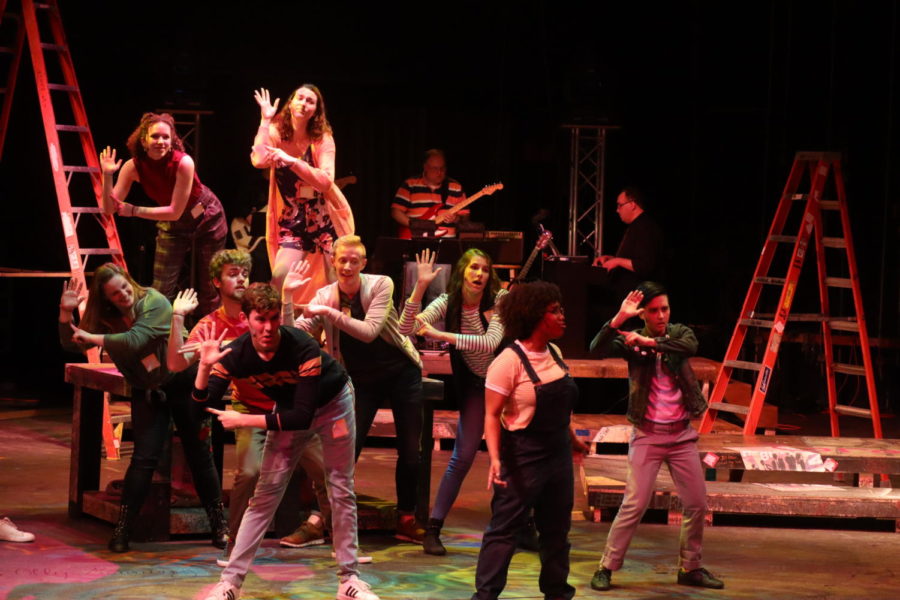How performing arts students and professors are transitioning to online
Cast members of “Godspell” practiced their production the night of April 2, 2019, before their opening night on April 5, 2019. The musical spreads messages of empathy, compassion and love.
April 7, 2020
College students all around the world are facing unique challenges as classes move to online formats, but one group of students harshly affected in particular are performing arts majors.
Due to the performance execution and face-to-face nature of these courses, it is difficult for students to receive the same level of instruction as other classes that are more compatible with remote formats.
“In these classes, performing for the class and getting coached by your professor is essential,” said Morgan Wolfe, a freshman in performing arts. “So having to attempt it online is very challenging and nearly impossible to have the same effect.”
Many class projects are difficult to do through video chats and phone calls. In order to make up for these missed opportunities, many professors are forced to change their projects to be more individualized.
“We were right in the middle of working on duets, which requires two people to be in a room with an accompanist,” said Cason Murphy, assistant professor of theater and music, regarding his musical theater class. “That’s been a class where I’ve kind of leaned on stuff the other theater faculty have been doing, which is the idea of creating class menus.”
These class menus offer students a wide variety of potential projects to earn their class credit. Projects include performance opportunities as well as creative outlets. Some are even humorous, like rewriting a song with quarantine-inspired lyrics.
“It’s what they deserve because that’s what I’d be giving them in class,” Murphy said. “So I’m trying to honor that commitment we had at the beginning of the semester.”
Another disappointment for Iowa State theater students is the postponement of the remainder of the HERoic theater season, including the productions “9 to 5” and “Of the Deep.” “9 to 5” was about to enter tech week and finish the details of the musical after spring break.
“We were going from our rehearsal space into actual theater space,” said Elise Cameron, a junior in performing arts. “It was our second day in there and we got to perform for some family members if we wanted to because we were afraid that we wouldn’t even get to do this.”
Shortly after, the play was officially postponed. Many students are grateful for the university not canceling the show altogether, but some are worried about conflicting schedules and seniors who will be graduating and relinquishing their roles.
Students are also feeling the effects that social isolation has on their mental health.
“Theater is about being around people, communication and community,” Cameron said. “It’s sad not being able to do that.”
The quarantine is also threatening some of the strongest beliefs within the theater community.
“There’s always an underlying ‘the show must go on’ mentality with theater people and the ramifications of this virus and social distancing have really cut that away,” Murphy said. “You can’t just be like ‘the show will go on’ and all of a sudden, someone gets infected because you decide to power on and have rehearsal.”
However, there are some benefits that the modification could have on the theater community. Many actors and performers are using technology to help innovate the way theater is done globally, allowing for more people to perform, access and study theater.
“Creative people sometimes need limitations,” Murphy said. “They need to be told you can’t get together. What do you do with that?”
The art of theater has been around for several thousand years. It has survived the Spanish Flu, world wars and other catastrophic events. It’s unlikely that theater will not go away anytime soon, and it has the chance to evolve into something new.







